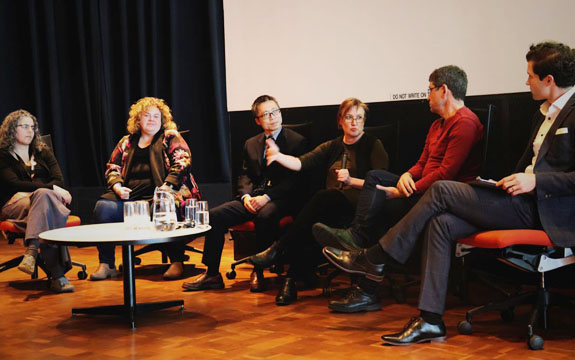Inspiring Swinburne’s research community and beyond

In Summary
- Swinburne researchers share insights into their careers
- Remaining agile, innovative and collaborative were mentioned as key drivers for a successful research career
- The discussion took place during a panel discussion at Swinburne’s Hawthorn campus
In an era where the world is changing at such a rapid pace, how can university researchers make sure they are remaining at the forefront of their field of research?
Remaining agile, innovative and collaborative were mentioned as key drivers for a successful research career, according to a group of leading Swinburne researchers.
Speaking on a panel, chaired by Associate Professor Alan Duffy, the researchers reiterated the importance of a continued commitment to research excellence.
Professor Matthew Bailes, Director, ARC Centre of Excellence for Gravitational Wave Discovery – OzGrav, discussed the early stages of his career and the positive role models who showed an enduring passion for research excellence.
“I was very fortunate to have good mentors early on in my career. I have only got to where I am today because of that initial training.
“When I was undertaking my PhD, my supervisor encouraged me to submit one of my first papers to Nature, the world's leading multidisciplinary science journal. I was pretty ignorant about the significance of this, but this push to go for the best from the very start really set the tone for the remainder of my career.
“It’s examples like that in my career that eventually led to me having the privilege of leading an ARC Centre of Excellence, right here at Swinburne.”
The importance of nurturing industry relationships, in order to collaborate at the right point in time, was also discussed by Professor Jo Barraket, Director, Centre for Social Impact.
“In the social impact space, we’ve been very fortunate to have long-lasting connections with industry and not-for-profits. Not only have we been able to benefit through knowledge sharing, but when the right time came along we were able to partner to undertake research and offer scholarships.
“But the key all along has been a focus on the importance of it being a partnership. You need to work together, collaborate and keep adding value to each other’s missions and causes.”
In an uplifting show of support for budding research talent across the university, Professor Aleksandar Subic, Deputy Vice-Chancellor (Research and Development), also encouraged staff to keep pushing the boundaries of what they think is possible.
“It is wonderful to see how our research community and staff in general are making our Research and Innovation 2020 Strategy a reality by generating significant outcomes for Swinburne. We must make the most of the research and innovation ecosystem that we have created, supported by the strategic partnerships we have established. Let’s keep going forward together. Let’s keep our minds open and be bold.”
The panel discussion was part of the Swinburne Staff Research Forum, held at Swinburne’s Hawthorn campus.

